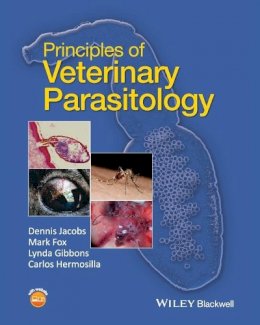ABOUT THE AUTHORS Dennis Jacobs, BVMS, PhD, FHEA, DipEVPC, FRCPath, FRVCS, Emeritus Professor, The Royal Veterinary College, London After graduating from the Glasgow Veterinary School and a short period in the pharmaceutical industry, he devoted his professional career to teaching and research. He has served as Vice-President of the World Association for the Advancement of Veterinary Parasitology and Secretary of the European Veterinary Parasitology College. Mark Fox, BVetMed, PhD, FHEA, DipEVPC, MRCVS, Professor of Veterinary Parasitology, The Royal Veterinary College, London He has over thirty years’ experience of teaching and research in the veterinary parasitology field, having graduated from The Royal Veterinary College and spent a period in small animal practice. His current research interests focus on the epidemiology of parasite infections in both domestic and wild animals. He was awarded the William Hunting medal in recognition of avian coccidiosis research. Lynda Gibbons, BSc, PhD, CBiol, FSB, Attached Senior Scientist, The Royal Veterinary College, London Having studied at Leicester University and the London School of Hygiene and Tropical Medicine, she became Head of Animal Helminthology Biosystematics at the CABI Institute of Parasitology. She is a recipient of the Elsdon-Dew medal (Parasitological Society of Southern Africa) and the Betts Prize (The Royal Veterinary College). Carlos Hermosilla, DrMedVet, DipEVPC, DrHabiI, DVM, Professor, Justus-Liebig-Universität Giessen Having gained a veterinary degree from the University Austral of Chile, and doctorates from Justus-Liebig-Universität in Germany, he worked as Senior Lecturer in Veterinary Parasitology at The Royal Veterinary College, London, before returning to the Institute of Parasitology in Giessen as Professor to continue his enthusiasm for teaching and research. He is also visiting professor at the University Austral of Chile.
This is one of the most complete and easy to read books on veterinary parasitology that I have reviewed. The authors have captured and distilled the important information that is available about parasites. They have succeeded in providing current information without succumbing to irrelevant detail. Their goal of stimulating readers to further investigate and challenge themselves has been met. (Dennis French, © Doody’s Review Service) Principles of Veterinary Parasitology is an excellent textbook for parasitology courses in veterinary and veterinary technology curricula because it emphasizes common elements of parasite groups, followed by descriptions of the most common and important group members. The authors have done an outstanding job of discussing characteristics to unite aspects of parasite infection that students can use to create a framework for understanding the individual species they will encounter in clinical training and practice. The book has a student-friendly layout with attractive and useful illustrations. Color-coded boxes provide additional information and tips for learning material. (JAVMA, March 2016) The text is well supported by an excellent andextensive image library that has had numerous contributors fromall over the world, and a large number of equally excellent handdrawn illustrations. (Veterinary Parasitology, April 2016) The four authors bring their substantial experience in parasitology but also in teaching which makes this book much less off-putting than the usual parasitology directories. Numerous pictures and drawings help one to understand the anatomy and the cycles of the parasites. The accompanying website contains the glossary but also guidance on the pronunciation of the exotic names of those creatures and also ways to identify them. (Vet Nurses Today, January 2016) "This textbook has been written primarily to meet the immediate needs of veterinary students, outlining the essential parasitological knowledge needed to underpin clinical practice, but I feel that is a great text for any veterinarian or veterinary nurse that has an interest in parasitology and I have enjoyed reading it" NZ Vet Nurses Association, June 2017

